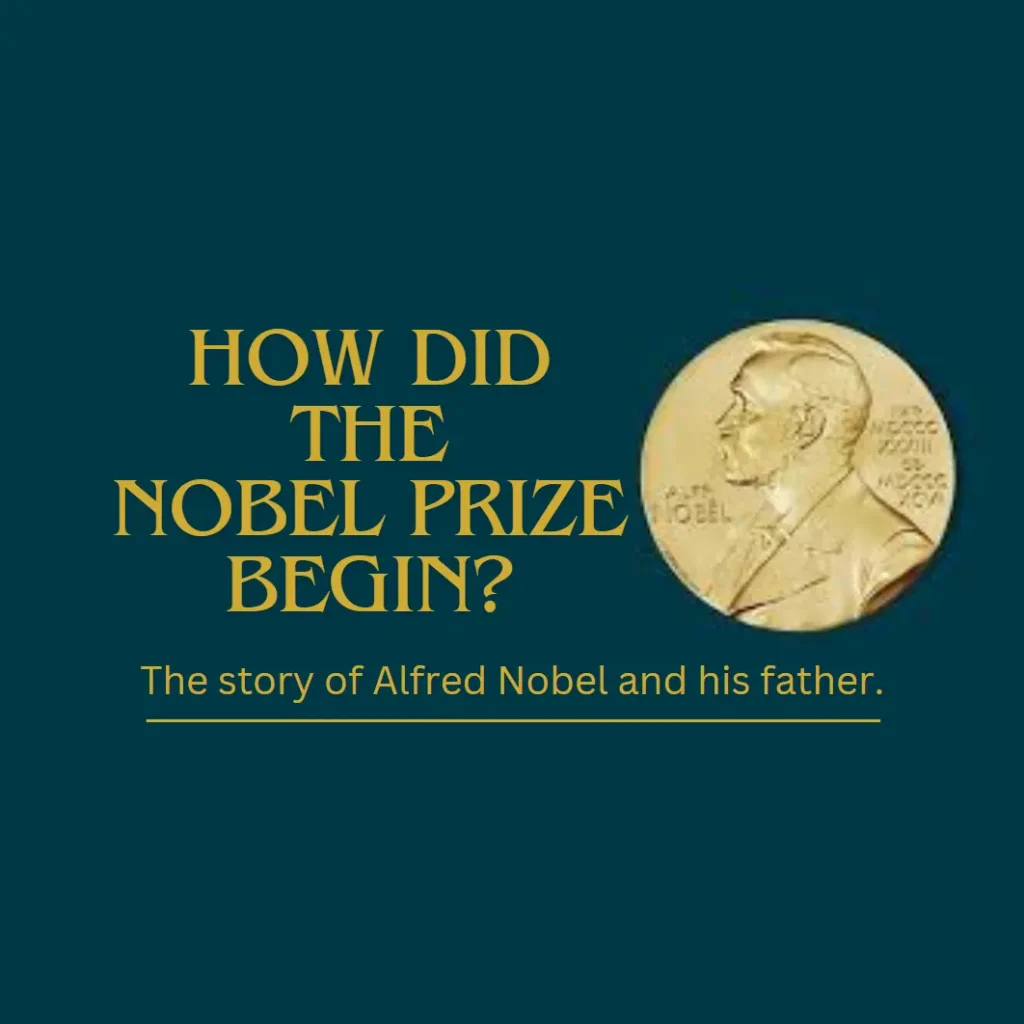The Nobel Prize, pronounced as no-BELL, is a highly coveted prize given to extraordinary works benefiting humanity. The prizes are given in the fields of physics, chemistry, physiology/medicine, literature, and peace. But, how did it start?
Alfred Nobel, a Swedish scientist, inventor and industrialist, left a will on his death intending to use his money to start an annual award to whoever does the most significant work benefiting humanity at large. The story starts not with Mr. Alfred Nobel, but with his father Immanuel Nobel.
Alfred’s father Immanuel Nobel was an inventor and builder. When Alfred was five years old, in 1838, his father moved to St. Petersburg, Russia where he set up an engineering factory. After Immanuel arrived in Russia, he became a successful manufacturer, inventor, and designer of machinery. He got into a contract with a Russian general named Ogarev, who was interested in the Swedish inventor’s designs for sea and land mines, and with whom Immanuel went into partnership for some time. Apart from sea and land mines, Immanuel’s company made machines for fabricating wheels, steam engines, and central heaters, and the business flourished.
Immanuel had three sons, Robert, Ludvig and Alfred. The Nobel brothers had a Swedish tutor – Lars Santesson, Master of Arts – who taught them Swedish language and history, but also provided them with a broad knowledge, including world literature and philosophy. They also had a skilled Russian teacher, Ivan Peterov who among other subjects taught them the fundamentals of mathematics, physics and chemistry.
Alfred Nobel never attended any university, nor did he obtain any degree. His tutorial instruction came to an end as early as 1850. While his older brothers Robert and Ludvig were busy working in the family engineering enterprise, Alfred was sent at age 17 out into the world on educational travels, first to Paris, where – at the recommendation of his chemistry teacher, Professor Zinin – he worked in the laboratory of the famous Professor Jules Pélouze. Here he came into contact with the Italian chemist Ascanio Sobrero, who had discovered nitroglycerine in 1847. Nitroglycerine possessed violent explosive power, but no one had devised a solution regarding how to control this highly dangerous substance.
Returning from his foreign travels in 1852, Alfred joined his two brothers at their father’s factory in St. Petersburg. Together with his father, Alfred had understood the enormous potential of nitroglycerine as an explosive and tried to develop a form that was less hazardous and easier to handle. Meanwhile, Immanuel Nobel’s financial reversals accumulated. The Russian government favored foreign suppliers at the expense of domestic ones, and Nobel’s St. Petersburg factory was left to its fate. Alfred was sent to London and Paris in an attempt to raise money to save his father’s business, but few investors wanted to risk money in Russia after the Crimean War. The sons saw the end coming, but Immanuel probably remained hopeful to the last. In 1859 it was all over. For the second time in his industrious life, Immanuel Nobel faced bankruptcy. Completely ruined, he and his wife and youngest son Emil left Russia in the summer of 1859.
Alfred devoted himself to the mechanical and chemical experiments that had occupied him previously, but that had been interrupted by illness and journeys undertaken for his father. The first visible results of Alfred’s experimental work were his first three patents, originated in St. Petersburg: a gas measurement apparatus in 1857, an apparatus for measuring liquids in 1859 and an improved design for a barometer or manometer in the same year – none of these of any great general importance.
Alfred also continued the nitroglycerine explosive experiments begun by his father, first working alone in St. Petersburg and later together with his father in Stockholm. The approaches that Immanuel had used proved to have been completely wrong. With his father’s failure in mind, Alfred tried entirely different methods for using nitroglycerine as an explosive.
In May or in June 1862, in the presence of his brothers Robert and Ludvig, he succeeded for the first time in causing nitroglycerine to explode, and, indeed, to do so under water. He had poured the substance into a glass tube, which he had stopped firmly. Then he placed the test tube in a zinc container that he filled with gunpowder. The other tube was stopped at both ends, and a fuse was introduced into the powder. He lit the fuse and threw the whole contraption into a canal, whereupon a sharp explosion and a substantial water spout hurled upwards, showing that the nitroglycerine had been completely exploded. During the winter 1862-1863 Alfred set off several successful explosions on the frozen Neva River.
The introduction to Russia of Alfred Nobel’s invention, dynamite, came only in 1877 when Alfred received a ten-year patent “to produce new solid explosive substances from liquid explosives.” In December the same year, the Diet (Parliament) of Finland, then an autonomous Grand Duchy under Russia, approved the introduction of dynamite. Alfred Nobel never had his own dynamite factory in Russia. Nevertheless, a large share of Alfred Nobel’s fortune came from his investments in Russia – more than SEK 5 million out of a total of SEK 33 million in his estate, which was an enormous sum at that time.
Nobel received 355 patents, and he had labs in multiple countries experimenting with making artificial silk to synthetic rubber. But, he is most known for his invention of dynamite. On the 10th December, 1896, Alfred Nobel died at the age of 63 years. He never married but he was very wealthy. So, when he died, a lot of his relatives came forward to enquire about his wealth. However, Alfred Nobel has set aside a very unique will, something that will change human history forever. He set aside most of his large amount of money to fund an annual award that will benefit humanity in five areas: physics, chemistry, physiology, medicine, literature, and peace. His relatives have fought the will asking for portions of inheritance of wealth. But, nothing happened. Eventually, the awards were conceived, and the first Nobels were awarded in 1901. In 1968, a sixth field was added for Economics.
Nominations are open to all people, with a few exceptions such as – you must be alive when nominated, and you cannot nominate yourself.
Hope this article inspires you and helps you understand the importance of inventions.
Thank you.
This article is heavily borrowed from the below reference:
https://www.nobelprize.org/alfred-nobel/alfred-nobel-st-petersburg-1842-1863/
You may like to read: Respect Multiple Intelligences, World Autism Awareness Week, & Character Development in Children


